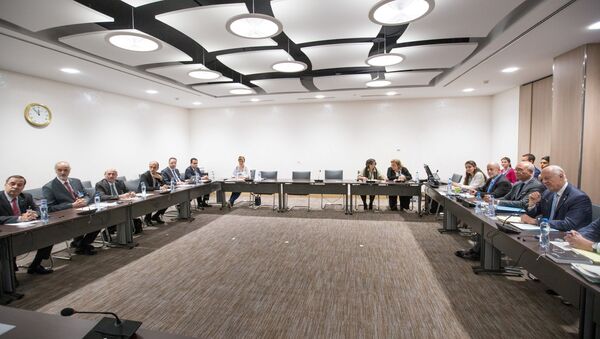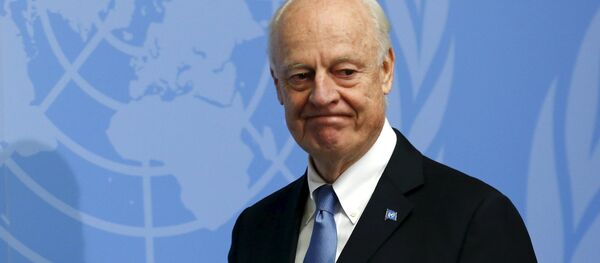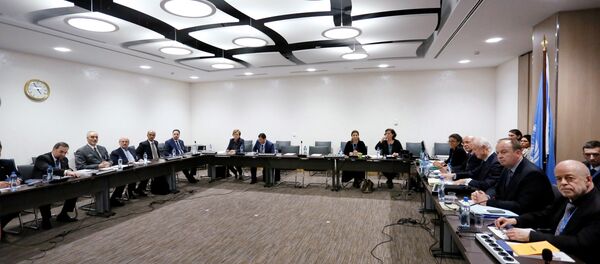GENEVA (Sputnik) — The eighth round of the intra-Syria talks in Geneva, which started on November 28 under the UN mediation, is now put on pause at least until Tuesday, apparently to give sides a chance to refresh and come back to the Swiss city in a better mood and with a more compromise-ready position.
So far, the round has been remarkable for gradually turning into a "war of all against all."
GOVERNMENT VS OPPOSITION
The contradiction between the government delegation in Geneva, led by Syria's Permanent Representative to the United Nations in New York Bashar Jaafari, and the opposition side, comprising various platforms, is well-known: the opposition insists that current President Bashar Assad "must go," and the government simply cannot talk to someone who says that.
During this round, however, the differences have become even more acute.
The opposition side made an effort: they finally formed a unified delegation for the talks. Previously, they — various opposition platforms — were quarrelling among themselves, refusing to recognize each other's right to exist. So, all that the government had to do in such a situation was just watch them fighting and say there was no counterpart at the talks, no delegation to negotiate with, especially directly.
One could expect direct talks, with both sides finally having distinct outline. However, the government team demonstrated no desire to even show up to talk to the others. Jaafari and other delegation members arrived in Geneva one day after the negotiations started, already after rumors spread they might not come at all.
Speaking to journalists only once after his meeting with UN Special Envoy for Syria Staffan de Mistura, Jaafari accused the opposition of setting preconditions for the talks, and called Riyadh-2 communique a clear provocation and irresponsibility, "undermining the path of Geneva-8." He left Geneva for consultations in Damascus and said "he will see" whether to return or not.
The opposition, in turn, called the departure of the government a demonstration of irresponsibility and preconditions for the talks.
UN VS SYRIAN SIDES
De Mistura tried to regain control over the situation. Late on Wednesday, he issued a didactic statement, in which he recalled his previous "requests that delegations participating in the intra-Syrian talks refrain from statements aimed at delegitimising other invitees," and "having however noted unhelpful statements in recent days," he urged the sides to stop such behaviour.
Unable to persuade the sides to have a direct dialogue, de Mistura tried a new, more intensive strategy of mediation: shuttling between the two rooms just within five meters from each other, where the delegations stayed.
Nevertheless, the negotiations were put on hold at least until December 5 when the invitees are expected to gather again and continue the efforts to find a peaceful solution for the Syrian civil war.
MOSCOW, DAMASCUS VS DE MISTURA
Jaafari told reporters before leaving that de Mistura had exceed his mandate as a mediator by proposing his own document on the Syrian settlement.
"We are not negotiating with a mediator, but through him. We oppose not the content of the document, but its form," Jaafari said.
Russian Ambassador to the UN Office in Geneva Alexey Borodavkin said on the first day of negotiations, November 28, that he had little hopes for Geneva-8, as Moscow had concerns about the format and the composition of participants, meaning inclusion in the opposition's delegation those who have a "non-constructive" and "detached from the Syrian realities" approach, according to the envoy.
Still, Moscow supports de Mistura's intention to continue this round of talks, and hopes that "the common sense will prevail among the opposition delegates, they will manage to see the political and military realities in Syria and correct their position, work out approaches for negotiations, instead of repeating pointless radical demands," Borodavkin said.
It is still too early to say whether de Mistura succeeded or failed in Geneva-8. Next week, the special envoy will continue his shuttling diplomacy.






